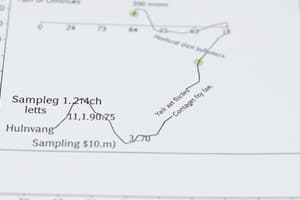Podcast
Questions and Answers
What role does qualitative research play in the understanding of causal mechanisms in political phenomena?
What role does qualitative research play in the understanding of causal mechanisms in political phenomena?
- It solely focuses on statistical correlations.
- It bypasses theoretical gaps in existing work.
- It mainly serves to validate large-N quantitative studies.
- It identifies and elaborates on causal mechanisms. (correct)
Why can findings from large-N quantitative studies be limited in understanding causal relationships?
Why can findings from large-N quantitative studies be limited in understanding causal relationships?
- They rely too heavily on qualitative observations.
- They fail to articulate relevant concepts in research design.
- They verify correlations without establishing causal mechanisms. (correct)
- They often do not consider observational data.
Which aspect of qualitative research contributes to strengthening the validity of causal inference?
Which aspect of qualitative research contributes to strengthening the validity of causal inference?
- Focusing exclusively on numerical data.
- Elimination of hypothesis testing.
- Refining hypotheses through qualitative observations. (correct)
- Using observational data without any adjustments.
In what way is qualitative research essential in the study of cultural influences on political science?
In what way is qualitative research essential in the study of cultural influences on political science?
What is often neglected in research methods that is critical for effective research design?
What is often neglected in research methods that is critical for effective research design?
What is the primary focus of qualitative research as described?
What is the primary focus of qualitative research as described?
Which of the following describes one of the activities supported by qualitative research?
Which of the following describes one of the activities supported by qualitative research?
What was a significant difference between Denmark and Britain regarding educational systems in the 19th century?
What was a significant difference between Denmark and Britain regarding educational systems in the 19th century?
Which factors did the author suspect influenced education system development in Denmark and Britain?
Which factors did the author suspect influenced education system development in Denmark and Britain?
What aspect of qualitative research aids in developing more robust theories about political processes?
What aspect of qualitative research aids in developing more robust theories about political processes?
Study Notes
Qualitative Research in Political Science
- Qualitative research is about careful listening, observing, and analyzing data, especially in the form of text.
- These qualitative methods can be helpful in constructing theories, identifying causal mechanisms, and evaluating their implications.
Theorizing Political Problems
- The author uses the example of education system development in Denmark and Britain to illustrate how qualitative methods can be used to understand distinct cultural frameworks and their influence on political choices.
Identifying Causal Mechanisms
- Qualitative research allows the identification of theoretical gaps and examination of causal mechanisms.
- This information is valuable as it provides a deeper understanding of how variables operate, unlike quantitative methods.
Cultural Influence
- The author argues that culture plays a vital role, shaping the exercise of power, especially in the context of labor and class struggles.
- The example of British and Danish authors' contrasting views on farmers and workers showcases the influence of cultural tropes on political processes.
- British authors often held a suspicious view of the working class, while Danish authors were more positive towards "small people," viewing collective efforts and worker education as crucial.
Research Design
- Qualitative research can face challenges in convincing editors and reviewers of its merit.
- However, mixed methods—combining qualitative and quantitative approaches—can overcome these barriers.
- Qualitative case studies, despite limitations in generalizability, can be strengthened through strategies like within-case analysis and careful consideration of most-likely and least-likely cases.
Text Analysis
- The author advocates for quantitative text analysis to examine large bodies of literature and identify empirical patterns over time, revealing insights into how authors collectively work with national symbols and narratives.
- This approach helps to understand how cultural tropes have evolved and influenced generations of writers.
Contributions
- Qualitative research provides a powerful tool for constructing plausible narratives about political events and actors.
- It is useful for formulating research questions consistent with the worldviews of those involved.
- It provides insights into the dynamics of causal processes and their effects.
- In addition, qualitative research helps to test hypotheses and validate proposed causal mechanisms.
Conclusion
- The author emphasizes the importance of understanding cultural factors in shaping contemporary politics, especially when analyzing culture wars and their effects on material interests, class cleavages, and democratic institutions.
- Qualitative research is crucial for comprehending the complexities of culture wars since their effects are often felt before they are fully understood.
Studying That Suits You
Use AI to generate personalized quizzes and flashcards to suit your learning preferences.
Related Documents
Description
Explore the critical role of qualitative research in political science through the analysis of cultural frameworks and causal mechanisms. This quiz covers methods that facilitate understanding political choices and the implications related to various educational systems. Engage with contemporary examples to deepen your grasp of qualitative methods in this field.




